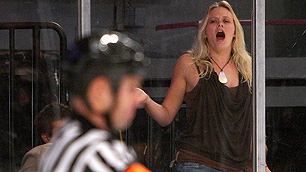At Endeavor Sports Performance, we see hockey players from a wide range of age and ability. We have players as young as 11 competing in Tier II youth programs up through the NHL. We’re very fortunate to have such a diverse population because it allows us to pick up on trends in movement patterns and structural asymmetries that develop over the player’s career. Being able to “look into the future” has really helped us develop better long-term player development training and programs and recommendations for players, parents, and coaches.
On that topic, I asked David Lasnier, who has been my right hand man for the last year and a half, to put together an article on a few things that all hockey parents should know in order to maximize their kids’ development. Check out his response below!
1. First, and most importantly in my opinion, your kid should have fun playing hockey!! I can give all the tips in the world about training, nutrition and injury prevention, but the most important thing parents need to know (and trust me there are wayyy too many that either don’t know it or just don’t care) is the first reason your kids play sports is to have fun. When you start to send them to every hockey clinic, every development camp and every showcase and you do that year-round when your kid is 10-years old, it’s not about fun anymore. Don’t get me wrong, I’m all about developing skills and taking the necessary steps to get better at one sport, but there is such a thing as overloading your kids too young. This is the first step toward them dropping out of hockey at a young age because they’re burnt out. Kids are kids; they’re not adults. There is no reason we should ask of them to get too serious too young; it’s true with sports and it’s true with everything else in life.
Another thing that leads me to believe that parents might not prioritize their kids having fun and enjoying the game is the way some of them behave in the stands. I’ve seen it happen too many times; parents yelling at their kids, at the referees or at the other players on the ice. I’m not talking about encouragement, but some parents flip out in the stands and get aggressive to a point it gets completely absurd! I’ve seen this happen in amateur hockey at pretty much every level, including Mites! What kind of message do you think it sends to your kid? There is no way when seeing that that the kid is going to think it’s all fun and he should enjoy himself on the ice. He’s going to get very competitive and play to win, and nothing else will matter. Parents need to understand that hockey, like every other sport, is a game. The first goal at the youth level is to have fun. There is a time to start to get competitive and to specialize in one sport, but anything under 13-years old is way too young.

Sit down.
2. This second point is very closely related to what I mentioned above. Don’t push your kid into specializing too early in one sport. For one, it might contribute to taking the fun out of the practice of their sport. But it also can lead to a lot of issues. Skating on the ice, much like other movement patterns from other sports, causes a certain stress to your body and your joints. It is important at a young age when the body is still in development that we don’t force kids into playing one sport year-round. This can lead to overuse conditions very young (Check out these studies: Sports-Related Injuries in Youth Athletes: Is Overscheduling a Risk Factor? and Early sport specialization: roots, effectiveness, risks.). It’s no coincidence that there are so many sports hernias, groin pulls and hip surgeries nowadays. Early specialization in sport is more common practice than it has ever been before. You impose a lot of stress on your joints from a very young age, you keep the stress accumulating by playing hockey year-round and never give them rest or use any injury prevention modalities to avoid reaching the injury threshold. Again, let kids have fun, play multiple sports in different seasons and don’t make or LET them specialize in one sport before they reach at least 15-years old.
3. The last thing is nutritional habits! We know that nutrition and sports performance are closely related. Whether most parents know that or not, I’m not sure, but I can tell you one thing: I don’t know many kids we train at Endeavor that actually have good nutritional habits. Most of them skip breakfast (and if they don’t they eat pop-tarts), they snack on candy all the time, and they show up to work out without having eaten anything in the previous 5 hours before their session! It’s part of our job as strength and conditioning coaches to educate kids on how to eat well and fuel their body to perform optimally. But in the end, if the parents are not educated themselves, or if they just don’t apply these good habits, we’re fighting a losing battle. We can tell the kids to eat more protein and more vegetables, but if the parents don’t encourage that, it’s just not going to happen. I don’t know of many kids who go food shopping by themselves (or simply have the power to decide what their parents are actually buying at the grocery store). That’s why it’s so important for the parents to be educated on that subject and make sure they give their kids good eating habits like eating a good breakfast every morning, prepare food for the day, have a pre- and a post workout meal/shake, etc.
Precision Nutrition: The best sports nutrition resource available (your kids will love these smoothie recipes)
Click here >> David Lasnier Sports Training
To your success,
Kevin Neeld